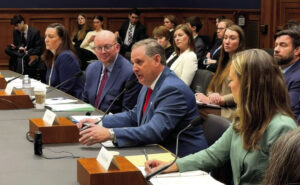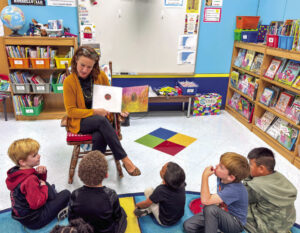The voice crying in the wilderness
By Staff
Editor's note: John 1:19 is the foundation of this Message of the Week.
By The Rev. C.E. Swain / special to The Star
Nov. 23, 2002
The day after we moved into the parsonage on the Carthage Circuit, I introduced myself to a stranger who said, "You must be Charlie Swain's boy." He had known my father and spoke well of him. Dad not only had a name, but also a reputation. He had influenced his community.
When people asked John the Baptist, "Who are you?" He didn't give his name, but said, "I am the voice of one crying in the wilderness … "
What's in a name?
When we were born, we were given two or more names. If you met a stranger who introduced himself just as Smith, you might not know anything about him. But if he said he was Bill Smith, you might know him by reputation.
Many of our names originated from the professions of our ancestors. The Mills owned the mill, the Carpenters built houses, etc.
Names in the Bible meant more than those of today. For instance, Isaac means "laughter." Perhaps his parents noticed what a jolly baby he was, so they said, "Let's call him laughter.'" The Indian maiden Mini Ha Ha perhaps reminded her parents of a babbling brook, so they named her "laughing waters."
I have heard a number of speculations as to how we Swains acquired our name. One explanation is that our ancestors were swine herders in England. So, it was a short step from "swine" to "swain."
As believers in God, our name is Christian because we have been adopted by the father of all things and his son, Jesus Christ, has adopted us as his brothers and sisters. But if we are Christian in name only, it is meaningless. In fact, it is less than meaningless.
I fear many of us Christians are like Willy Loman from the play "Death of a Salesman," by American playwright Arthur Miller. Loman was a loser because he could never find himself. After his death by suicide, his son, Biff, said of his father, "He never knew who he was."
When John was asked who he was, he answered, "I am a voice. I am an influence."
If our voice is to have any meaning, it has to have a tongue, and the Bible has a lot to say about how we use our tongue. With our voice, we encourage and build up one another. And, with the same voice, we discourage and tear one another down.
John's voice was one of hope, but we remember some very frightening voices of doom and death out of the past.
The Germans were some of the most intelligent and civilized people in the world, but Adolph Hitler's voice led a whole nation to murder millions of innocent men, women and children.
Then there was Jim Jones. In the name of God and with the voice of religion, he led, in the words of the Psalmists, a thousand people "as sheep to the slaughter." He convinced more than 900 people to commit suicide.
But, I'm too intelligent to be hoodwinked like that. We are too smart to be led astray. But are we?
Forty years ago, people of Mississippi listened to the voices of prejudice and hate, then went to the polls and elected a leadership that carried the state down the road of violence, bloodshed and shame. Not only was that an example of the power of the voice to convince and deceive, but also of just how gullible we humans are and how easily we are misled and manipulated by others.
Gradually, out of that darkness could be heard "the voices of reason and understanding." Slowly, the voices of good will and compassion could be heard above the storm.
One name, one voice
Sometimes we wonder if the world is much different than that of 2,000 years ago, when King Herod ordered all boy babies born killed in an effort to secure his position of power. Apparently many feel the need to kill and be killed. Rachel is still weeping for her children that are no more. The sound of wailing for the dead fills the land.
A few months ago, we honored the dead of 9-11-01. A year later, we are still horrified at the carnage of that day. Emotions ranged from the deepest sadness to white hot rage as hour after hour, the names of sons and fathers, husbands and wives, mothers and daughters and friends were read. It took almost a whole day just to read the names of those who died in that tragedy.
From that experience came a great surge of patriotism and love for America. But sometimes when we are singing, "God Bless America," I hear Jesus saying, "Love your enemies."
But how in the world can I love people who would do such a thing to other people? I wonder.
Then, I remember the morning after Desert Storm began. A picture was flashed on TV that showed an empty portion of the desert with one Iraqi soldier's boot sticking out of the sand. The other day I thought about that picture and wondered how I could obey the command of Jesus to love my enemy.
In my imagination, I decided to find the other boot that matched the one in the sand and walk in the footprints of that dead Iraqi soldier for awhile.
As I walked, I began to do a little math. Suppose the Iraqi people decided to honor their dead of Desert Storm the way we honored our dead of Sept. 11 by reading the names of each individual who died.
If they began on Oct. 22 and read 3,000 names each day, on Christmas Day they would still be reading the names of the sons and fathers, brothers and husbands who died. And since civilians were killed by our bombs and missiles, the names of mothers and daughters, wives and friends also would be read. No doubt there would be the names of some children on the list.
After two months, they would still be reading the names of those who perished. Each of those names belonged to a voice we silenced. Each name belonged to a person we killed. And some people thought it fun. Some thought of the killing as a sport, such as dove hunting, and called it a "turkey shoot."
I guess at this stage of human development, or more accurately at our stage of nondevelopment, there is still a need for the warrior. Apparently, many still think there is a need for us to kill and be killed. But long after the man of war has been forgotten, the man of peace will still be remembered and honored.
There are many different voices crying out in the wilderness of our time. All of them are clamoring for our attention.
Which ones will we listen to and heed. Whose voice will we follow?
After retiring in 1983 from North Biloxi United Methodist Church, the Rev. C.E. Swain and his wife are at home in Neshoba County. He occasionally conducts worship services at Madden United Methodist Church in Leake County.







